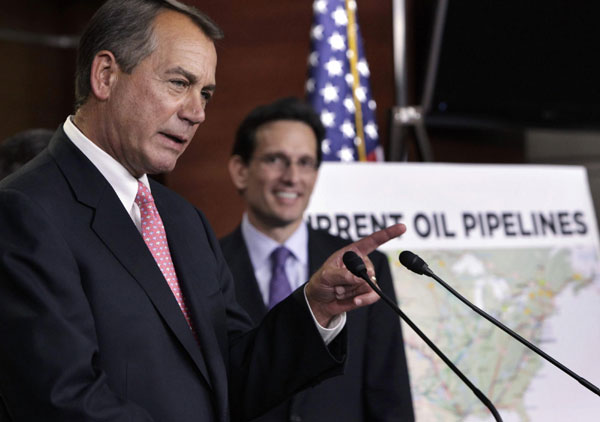Obama rejects US-Canada pipeline project
Updated: 2012-01-19 10:45
(Xinhua)
|
||||||||
NEW YORK - US President Barack Obama on Wednesday denied a permit for the proposed Keystone XL pipeline from Canada to the southern US state of Texas, citing "arbitrary" factors forced by Republicans but leaving the door open for a new application in the future.
In a White House statement, Obama said he had chosen to accept the State Department's recommendation that the pipeline be denied a permit because it would not be in the national interest.
The president blamed congressional Republicans for ignoring the administration's call for a prolonged review process over the project until 2013 by imposing an arbitrary deadline on the project.
"As the State Department made clear last month, the rushed and arbitrary deadline insisted on by congressional Republicans prevented a full assessment of the pipeline's impact, especially the health and safety of the American people, as well as our environment," Obama said.
 |
|
US House Speaker John Boehner (R-OH) (L) gestures next to House Majority Leader Eric Cantor (R-VA) during the GOP news conference about the Keystone XL pipeline decision on Capitol Hill in Washington January 18, 2012. [Photo/Agencies] |
The announcement over the fate of the Keystone project came after recent political bickering between the White House and Republicans in Congress.
White House officials had raised doubts over the Keystone pipeline's possible environmental effects on US lands, such as water contamination caused by leaks, saying an extended review could help lesson such concerns.
But in December Republicans included a provision into a payroll tax cut extension that obligated the administration to make a final decision on the project by February 21 of this year, which prompted the outright rejection.
The White House decision has met with criticism from Republicans. Front-running GOP presidential candidate Mitt Romney called the rejection "as shocking as it is revealing."
"By declaring that the Keystone pipeline is not in the 'national interest,' the President demonstrates a lack of seriousness about bringing down unemployment, restoring economic growth, and achieving energy independence," Romney said in a statement.
Senate Minority Leader Mitch McConnell, a Republican, said Keystone was an "obvious choice" for increasing more US jobs and reducing foreign oil dependency. "The only thing standing between thousands of American workers, and the good jobs this project will provide is President Obama."
Canada has expressed its disappointment over the US decision. In a telephone conversation with Obama, Canadian Prime Minister Stephen Harper said he was "profoundly disappointed" with the decision, the prime minister's office said in a press release.
"He indicated to President Obama that he hoped that this project would continue given the significant contribution it would make to jobs and economic growth both in Canada and the United States," said the statement. "The prime minister reiterated to the president that Canada will continue to work to diversify its energy exports."
But Obama's decision to block the Keystone project does not spell finale to the joint US-Canadian energy initiative. Explaining the reasoning behind the decision, Obama said the announcement was "not a judgment on the merits of the pipeline, but (on) the arbitrary nature of a deadline that prevented the State Department from gathering the information necessary to approve the project and protect the American people."
This means that TransCanada, the Keystone pipeline applicant, could lodge a new application to the US government that would make environment-friendly changes to its current plan, such as proposing an alternative pipeline route that would bypass certain areas with the water-contamination concerns.

 Relief reaches isolated village
Relief reaches isolated village
 Rainfall poses new threats to quake-hit region
Rainfall poses new threats to quake-hit region
 Funerals begin for Boston bombing victims
Funerals begin for Boston bombing victims
 Quake takeaway from China's Air Force
Quake takeaway from China's Air Force
 Obama celebrates young inventors at science fair
Obama celebrates young inventors at science fair
 Earth Day marked around the world
Earth Day marked around the world
 Volunteer team helping students find sense of normalcy
Volunteer team helping students find sense of normalcy
 Ethnic groups quick to join rescue efforts
Ethnic groups quick to join rescue efforts
Most Viewed
Editor's Picks

|

|

|

|

|

|
Today's Top News
Health new priority for quake zone
Xi meets US top military officer
Japan's boats driven out of Diaoyu
China mulls online shopping legislation
Bird flu death toll rises to 22
Putin appoints new ambassador to China
Japanese ships blocked from Diaoyu Islands
Inspired by Guan, more Chinese pick up golf
US Weekly

|

|






